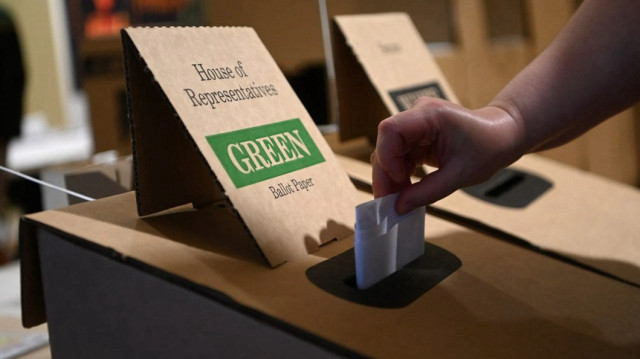
Polling centers close in Queensland, New South Wales, Victoria, Australian Capital Territory, Tasmania, while voting continues in western states
Polling in Australia's parliamentary election has ended in eastern states, and the counting has begun.
Polling centers have closed in Queensland, New South Wales, Victoria, the Australian Capital Territory, and Tasmania, according to ABC News.
Earlier on Saturday morning, the polling began at 8 am local time (2200GMT Friday) where more than 18 million Australians were registered to cast ballots under the country's compulsory voting system.
Ballot counting began in the eastern states of New South Wales, Victoria, and Queensland, while voting continues in Western Australia as the country has three different time zones.
The center-left Labor Party, led by Prime Minister Anthony Albanese, is seeking a second term after securing a narrow majority in 2022.
The main challenger is the center-right Liberal-National Coalition, now led by Peter Dutton.
If neither bloc secures 76 seats in the 150-member House of Representatives, the country may again see a minority government, a scenario last seen in 2010.
Half of the Senate's 76 seats are also up for grabs.
Economic issues have dominated the campaign, with inflation, rising living costs, and housing affordability taking center stage.
Political analyst Nathan Fioritti noted that both major parties have struggled to offer substantial solutions.
“Support may shift toward smaller players like the Greens, who are proposing more transformative policies,” he said.
Fioritti predicted a similar pattern to 2022 when Labor and the Coalition each secured roughly 30% of the vote.
“There is growing frustration with the political status quo,” he said.
Amid that backdrop, independents and minor parties, particularly the progressive Greens and "Teal" independents, could again become power brokers.
Seven Teal MPs currently hold seats, having unseated the Liberals in traditionally safe districts by focusing on climate policy and transparency.
Campaigns like the Muslim Vote movement are also targeting key marginal seats, especially in response to Australia's perceived stance on the onslaught in the Gaza Strip.
“The issue could influence voters sympathetic to the Palestinian cause, potentially affecting the formation of a minority government,” said Fioritti.
While domestic challenges dominate, international concerns are also influencing voter sentiment.
US President Donald Trump's second term has brought unpredictability to global affairs, prompting voters to weigh which party could best manage the Australia-US alliance.
Still, experts believe the Trump factor remains a background concern compared to economic matters.
“Trump's shadow is present but not central,” said Charles Miller from the Australian National University.
On foreign relations, both major parties are expected to continue Australia's strategic alignment with the US, while cautiously engaging China on trade.
“A softer approach to the US is expected, regardless of the outcome,” said Miller.
Voting in Australia is compulsory, with non-participation fined Australian dollars $20 ($13).
Since its introduction in 1924, voter turnout has consistently exceeded 90%, making Australia one of the highest-participating democracies in the world.
Hello, the comments you share on our site are a valuable resource for other users. Please respect other users and different opinions. Do not use rude, offensive, derogatory, or discriminatory language.
The floor is all yours.








